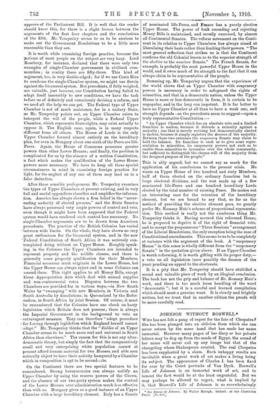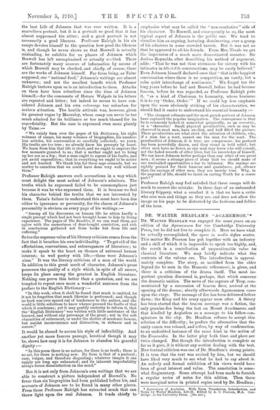JOHNSON WITHOUT BOSWELL.*
WE° has not felt a pang of regret for the fate of Cleopatra P She has been plunged into an oblivion from which she can never return by the same hand that has made her name immortal. However many pages of her diary or her private letters may be dug up from the sands of Egypt, the sound of her name will never call up any image but that of the chaugeling whom Shakespeare created. The real Cleopatra has been supplanted by a sham. Such unhappy results are inevitable when a great work of art makes a living being its subject. The appearance of Charles I. has been -fixed for ever by the Court portraits of Van Dyck. Boswell's Life of Johnson is an immortal work of art, and to lament the fact would be at the least ungrateful. But we may perhaps be allowed to regret, what is implied by it, that Boswell's Life of Johnson is so overwhelmingly • Six Essays on Johnson. By Walter Raleigh. Oxford; at the Clarendon Press. [5s. net.]
the best Life of Johnson that was ever written. It is a marvellous portrait, but it is a portrait so good that it has almost suppressed the sitter ; and a good portrait is not necessarily a good likeness. Profe3sor Raleigh in his six essays devotes himself to the question bow good the likeness is, and though he never shows us that Boswell is actually misleading, he exhibits for us phases of Johnson which Boswell has left uneraphasised or actually omitted. There are fortunately many sources of information by means of which Boswell may be checked, and chiefly. of course, there are the works of Johnson himself. Far from being, as Taine supposed, our "national food," Johnson's writings are almost unknown ; and not the smallest benefit which Professor Raleigh bestows upon us is an introduction to them. Attacks on them have been relentless since the time of Johnson himself,—for the comments of Horace Walpole in his letters are repeated and bitter; but indeed he seems to have con- sidered Johnson and his own entourage too suburban for seriors attention. The hostile attitude was, however, given its greatest vogue by Macaulay, whose essay can never be too much admired for its brilliance or too much blamed for its superficiality. But the case is expressed even more plainly by Taine:—
" We vainly tarn over the pages of his Dictionary, his eight volumes of essays, his many volumes of biographies, his number- less articles, his conversation so carefully collected; we yawn. His truths are too true ; we already know his precepts by heart. We learn from him that life is short, and we ought to improve the few moments granted to us ; that a mother ought not to bring up her son as a fop ; that a man ought to repent of his faults, and yet avoid superstition ; that in everything we ought to be active and not hurried. We thank him for these sage counsels, but we mutter to ourselves that we could have done very well without them."
Professor Raleigh answers such accusations in a way which must delight the most ardent of Johnson's admirers. The truths which he expressed failed to be commonplaces just because it was he who expressed them. It is because we feel his character behind the truths that we are interested by them. Taine's failure to understand this must have been due either to ignorance or perversity, for the charm of Johnson's personality is obvious on every page of his writings :-
"Among all his discourses on human life he utters hardly a single precept which had not been brought home to him by living experience. The pages of The Rambler, if we can read them, are aglow with the earnestness of dear-bought conviction, and rich in conclusions gathered not from books but from life and suffering."
So too the supreme value of his literary criticism comes from the fact that it breathes his own individuality. "To get rid of the affectations, conventions, and extravagances of literature ; to make it speak to the heart on themes of universal human interest; to wed poetry with life ;—these were Johnson's aims." It was the literary criticism of a man of the world. In addition to this great merit of character, Johnson's prose possesses the quality of a style which, in spite of all sneers, keeps its place among the greatest in English literature. Nothing can prove this better than a quotation, and we are tempted to repeat once more a wonderful sentence from the preface to the English Dictionary :—
"In this work, when it shall be found that much is omitted, let it not be forgotten that much likewise is performed; and though no book was ever spared out of tenderness to the author, and the world is little solicitous to know whence proceed the faults of that which it condemns; yet it may gratify curiosity to inform it, that the 'English Dictionary' was written with little assistance of the learned, and without any patronage of the great ; not in the soft obscurities of retirement, or under the shelter of academic bowers, but amidst inconvenience and distraction, in sickness and in sorrow."
It would be absurd to accuse his style of inflexibility. And another yet more famous passage, heretical though it may be, shows how easy it is for Johnson to abandon his graceful dignity :—
" In this poem there is no nature, for there is no truth; there is no art, for there is nothing new. Its form is that of a pastoral ; easy, vulgar, and therefore disgusting ; whatever images it can supply are long ago exhausted; and its inherent improbability always forces dissatisfaction on the mind."
But it is not only from Johnson's own writings that we are able to construct a picture independent of BoswelPs. No
fewer than six biographies had been published before his, and accounts of Johnson are to be found in many other places From these Professor Raleigh has extracted much that can throw light upon the real Johnson. It tends chiefly to emphasise what may be called the " non-combative " side of his character. To Boswell, and consequently to us, the most typical aspect of Johnson is the public one. We tend to visualise him as arguing, lecturing, domineering, over a group of his admirers in some crowded tavern. But it. was not so that he appeared to all his friends. From Mrs. Thrale we get the impression of a much more domesticated monster. Sir Joshua Reynolds, after describing his method of argument, adds: "That he was not thus strenuous for victory with his
intimates in tete-a-tote conversations, may be easily believed." Even Johnson himself declared once that" that is the happiest conversation where there is no competition, no vanity, but a calm quiet interchange of sentiments." We forget too the long years before he had met Boswell, before he bad become famous, before be was regarded, as Professor Raleigh puts it, "as a kind of Chairman to humanity, whose business-. it is to cry 'Order, Order.'" If we could lay less emphasis upon the more obviously striking of his characteristics, we
should find it easier to understand his essential humanity :—
" The cheapest estimate and the most garish portrait of Johnson have captured the popular imagination. The consequence is that he is commonly looked at somewhat quizzically, as an eccentric, or a 'character.' Small physical peculiarities, such as may be observed in most men, have swollen, and half filled the picture. These peculiarities are what rivet the attention of children, who, if a man has a wart, cannot see the man for the wart. The. peculiarities of Johnson, it is true, are conspicuous ; his portrait . has been powerfully drawn, and they stand in bold relief ; but other men have no fewer, as any man may learn \rho will consult, not the faded records of other lives, but his knowledge of himself. We can know Johnson better perhaps than any other of our great men ; it seems a strange piece of irony that we should make of - our unrivalled opportunities a bar to intimacy. His sayings are. rightly praised for their humour and quaintness, yet, oftener than the sayings of other men, they are merely true. Why, in the pageant of life, should we insist on casting Truth for a comic part ?"
Professor Raleigh may feel satisfied that these essays will do. much to correct the mistake. In these days of an unbounded literary frippery, what a comfort it is that we have a critic who sees men and things as they are, and does not allow the image on his page to be distorted by the fashions and follies.. of the hour.



































































 Previous page
Previous page